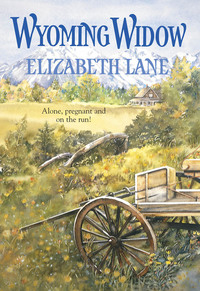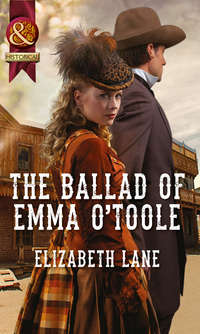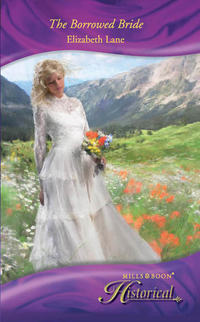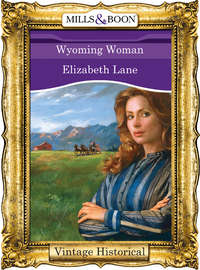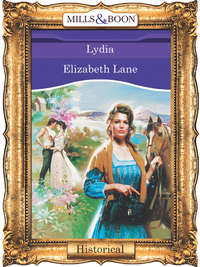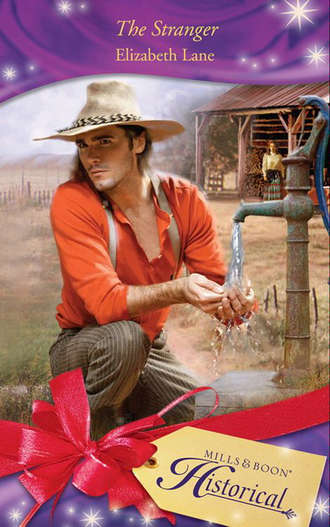
Полная версия
The Stranger
He stepped away from the bed as Laura finished the wrapping and knotted the end of the flannel strip. Robbie lay back on the pillows, quiet now.
“Keep the arm raised as much as you can,” Caleb said. “That will ease the swelling.”
Laura rearranged the pillows to support the splinted arm. “I’m going to make you some chamomile tea, Robbie. You can get up later, after you’ve rested awhile.” She glanced back at Caleb, who was moving toward the bedroom door. “I’m beholden to you, Caleb McCurdy. Why don’t you bring your food into the kitchen and eat at the table. I’ll get you some cold cider and a slice of apple pie to go with the sandwich. That’s the least I can do.”
He hesitated for the space of a breath, as if pondering her offer. Then he thanked her and left the room. Laura covered Robbie with the soft merino blanket that had comforted him since babyhood. Bending, she brushed a kiss across his forehead. “Your father would have been so proud of you, my little love,” she murmured. He gave her a teary smile. She kissed him again and hurried out to the kitchen.
Caleb unwrapped his sandwich and laid it on the chipped bone china plate Laura had placed in front of him. He had sat at the same table five years ago. This time he occupied the place at the end, where Mark Shafton had sat on that day of horror.
Caleb was hungry and the food was well prepared. But his dry mouth had lost its ability to taste. Why had he come back here, to this place, these memories and this beautiful, damaged woman? He should have headed west to California or south to Mexico, where he could put the past behind him. Instead he’d chosen to open old wounds, and he was already bleeding.
Laura stood at the stove, measuring dried chamomile into a porcelain pot. He noticed the way she kept the left side of her face turned away from him, hiding the scar. “We don’t get many travelers out here since they finished the railroad,” she said, making polite conversation. “Where are you headed?”
“Texas. San Antone, most likely. Thought I’d take my time and see some new country on the way.” Another lie, as was everything he’d told her except his name. “I don’t see any hired help around,” he said, changing the subject. “How do you manage out here, a woman alone with a youngster? Wouldn’t you be better off selling the place and moving to a town?”
“I might.” She poured boiling water into the teapot. The flowery aroma of chamomile drifted into the room. “But I stay here to keep the land for Robbie. That’s what his father would have wanted—a legacy for him, his children, his grandchildren…” Her voice broke slightly as she spooned some honey out of a jar and dribbled a little of it into the tea. “I sold off the beef cattle and the spare horses after Mark died,” she said. “I wasn’t up to taking care of them, and I needed the money to live on. Steers and mustangs can be replaced. Land can’t. I’ll wear rags and go barefoot before I sell a single acre.”
Struck by the passion in her voice, Caleb studied the proud angle of her head and the determined thrust of her jaw. He had thought of Laura as fragile. But underneath her porcelain doll exterior was a core of tempered steel. He had glimpsed that steel when she’d turned on Zeke, sunk her teeth into his arm and grappled for the knife that would slash her face. Now he was seeing it again.
He should have guessed he would find her here, holding on to what was hers. So why hadn’t he turned around and left as soon as she opened the front door? Why was he still here, risking the chance that he might be recognized?
“But it doesn’t make sense to sit on the land while your money runs out,” he heard himself saying. “A ranch like this one could make you a right handsome living. You could run a herd of cattle, fatten them up on this good grass and ship them east by rail, or sell them to the army. Sheep would do all right in this country, too.”
She toyed briefly with her thin gold wedding ring. “You sound like my husband. He always said that one day we’d have the finest ranch in New Mexico.”
Caleb’s throat constricted around the piece of bread he’d just swallowed. He willed himself not to choke.
“I became a widow six months before Robbie was born,” she said. “I didn’t know the first thing about running a ranch. It was all I could do to survive and take care of my baby. When my nearest neighbor offered to buy the stock, I agreed to his offer, even though I knew he was getting a bargain. I needed the money.”
Caleb took a sip of cold cider and managed to swallow it. If he had any brains he’d get up from the table, thank Laura for the meal and ride away before he dug himself any deeper. But there was the matter of a small, broken boy who might yet need a trip to the nearest doctor. And there was the matter of this scarred, beautiful woman to whom he owed a monstrous debt.
Caleb’s mother had told him that among her people, if someone died because of another’s actions, the bereaved family had the right of adoption. They could claim the offender to take the place of their lost loved one and help provide for their family. It was a wise custom, one that served both justice and practicality.
Not that Caleb could ever replace Mark Shafton as husband, father and provider. That notion was unthinkable. But if he could teach Laura how to run the ranch, get her started with some cattle and hire some reliable help before he moved on, it might at least ease his conscience.
“You’ve got the makings of a good ranch here,” he said. “But the place needs some work. The windmill, the fences, the sheds…”
“Yes, I know.” She poured the tea into a small blue cup, set it on a saucer and added a splash of milk. “When Robbie’s a little older, I’ll have more time to spend keeping the place up. I’m not as helpless as I look. I can hammer nails and slap on whitewash with the best of them. But right now, I don’t dare turn my back on the little mischief. You saw what happened today.”
“I could help you,” Caleb said, feeling as if he’d just stepped over the edge of a cliff. “For a few good meals and a spot to lay my bedroll, I could have the place looking like new.”
She looked hesitant, and for an instant he felt his heart stop.
“You understand it wouldn’t be a regular job,” she said. “It would only be for a week or so, and I can’t spare the money to pay you. If you’d be satisfied with a bed in the toolshed and three square meals a day—”
Caleb forced himself to grin. “Lady, for pie like this, I’d mend fences all the way from here to California!”
She picked up the cup and saucer in her workworn hands. Again, as she moved toward the bedroom, Caleb sensed her hesitation. He was a stranger. And even if you were kind to them, strangers could turn into monsters.
“Give me time to think about it,” she said. “I’ll let you know.”
“Fine.” Caleb laid down his fork and rose from his chair. “While you’re thinking, I’ll go outside and start on that broken windmill.”
Without giving her a chance to protest, he walked out the front door and closed it behind him. By the time he reached the bottom step, his knees were shaking. What in hell’s name did he think he was doing? If Laura recognized him, he could be a dead man or, worse, on his way back to prison for life. Mount up and ride away, that would be the smart thing to do. Laura was a strong woman. She could manage fine without his help.
But the force that had drawn him to this place was pulling him deeper into Laura’s life. Whether it was guilt, duty or destiny’s unseen hand, Caleb sensed that he’d come here for a reason. Whatever the cost, he could not leave until he understood what that reason was.
Picking up the hammer and nails where he’d dropped them by the corral gate, he strode to the base of the windmill and began to climb.
Chapter Three
Laura had taken extra pains with supper, mixing up a batch of sourdough biscuits, churning fresh butter and adding a pinch of precious ground seasonings to the rabbit stew. Caleb McCurdy had put in a long, hard afternoon, she reasoned. Not only was the corral gate mended, but he’d replaced the missing vanes on the windmill and patched the holes in the roof of the chicken coop, to say nothing of setting Robbie’s arm. Since she had no money to pay him, the least she could do was serve him a decent meal.
Glancing out through the kitchen window, she could see him washing at the pump. He’d tossed his brown flannel shirt on a sapling and unbuttoned the top of his long johns to hang around his waist. He was bending forward, letting the water stream through his raven hair. Now, slowly, he straightened, raking his fingers through his dripping locks. Water flowed over his bare shoulders to trickle down along the muscled furrow of his spine and vanish beneath the damp waistband of his denims. He was as lean and sinewy as a tom cougar with no trace of fat on his lanky frame. Where the setting sun shone on his wet skin, he blazed with liquid fire.
Turning, he cupped his hands and sluiced water over his chest and under his armpits. The nicks and scars that marred his coppery body spoke of violent times and rough living. Laura’s fingers tightened on the frame of the window. Caleb McCurdy had appeared out of nowhere, like an angel in her time of need. But he was clearly no angel. His dark eyes were too feral, his reflexes too quick. He had all the marks of a wild animal, ready to strike out at the first unguarded moment. She could not afford to trust him—or any other man in this godforsaken, bullet-riddled country.
So why did she stay? Laura had long since stopped asking herself that question. She knew the answer all too well.
Another letter had arrived last week, this one from her sister Jeannie, urging her to leave the ranch and come home to St. Louis. There would be a room for her in the family home, Jeannie had said, and a room for Robbie, where he could grow up safe and happy, surrounded by people who cared for him.
For the space of a breath Laura had been tempted. But who would she be in St. Louis? The scarred sister, hiding from curious eyes in some upstairs room, a prisoner of her own ugliness. And Robbie—he would be the son of a dead father and an unseen mother, dependent on others for a leg up in the world. Here the boy was heir to five hundred acres of fine ranch land. Here he would have his own piece of the earth. He would grow up to be a strong, independent man. For Robbie’s sake she had to stay—to bear the hardship of grinding work and the lonely terror of black nights. Her own life had ended with the flash of a knife and the roar of a pistol. Now she lived for her child and the man he would become.
Caleb McCurdy glanced toward the house. Laura shrank back from the window. Heaven forbid he catch her watching him. The last thing she wanted was to put wrong ideas into the man’s head—ideas that might be there already, she reminded herself. She would be wise to keep the shotgun handy.
He was reaching for his shirt now, thrusting his glistening arms into the sleeves. Soon he’d be coming inside to eat. It was time she fetched the milk from the springhouse.
She had left the milk until the last minute because the day was hot and she didn’t want it to spoil. Besides, there was nothing better than ice-cold milk after a day’s work, especially with hot, buttered biscuits.
Slipping into her bedroom, she took a moment to check on Robbie. The boy had passed a restless afternoon, but an hour ago he’d taken some warm broth and fallen into exhausted slumber. Now he lay curled on his side, his splinted arm resting on a pillow. Aching with love, Laura leaned over the bed and brushed a kiss where one damp golden curl fell across his forehead. He was her boy, her perfect, precious son.
What if she’d lost him today in that terrible fall from the tree? For the space of a heartbeat she’d feared…But no, Laura forced the thought from her mind. Robbie was safe now. His arm would heal, and soon he’d be good as new.
The springhouse, a sturdy log building the size of a very small room, stood just a few steps from the back door. Laura’s husband had built it over the creek, which he’d diverted from its true channel by means of a timber dam, covered with earth and sod. Inside the springhouse there was a perforated tin cool box set into the water, as well as shelves and hooks for hanging meat. It was a clever piece of engineering. Mark had been proud of his work; but after his death, Laura had come desperately close to dousing the structure with kerosene and burning it to the ground. Only practical need, coupled with the danger of setting the house on fire, had stayed her hand.
Even after five years, she could not step into that clammy darkness without feeling sick. Her hand shook as she turned the key in the steel padlock. The door creaked softly as it swung inward.
Her skin began to crawl as she forced herself across the threshold. There was no sound except the gurgling of water, but the buried echo of a gunshot lingered in the wooden heart of each log that formed the walls. The mossy earth was rank with remembered odors—gunpowder, blood, and the awful aftermath of death. Steeling herself against a rush of nausea, Laura bent and lifted the milk from the tin box. The jug was cold and dripping wet between her hands. She hurried outside with it, gulping fresh air into her lungs. For a moment she stood still, letting the twilight settle around her. The fading sun was warm on her face. A rock wren piped from the foothills beyond the tool shed.
Balancing the jug on her hip, she used her free hand to hook the padlock through the hasp and squeeze it firmly closed. Only then did her pulse slow to its natural rhythm. She would be all right now. The horror was locked away…until next time.
A furtive glance told her that Caleb McCurdy was no longer at the pump. An instant later she spotted him at the corral fence, filling the water trough. His arms lifted the big bucket as if it had no weight, pouring the water carefully so that none would spill and be wasted. In the fading light, his wet hair gleamed like polished jet.
Turning, he gave her a nod. “Anything you need?” he asked, raising his voice to be heard across the distance.
“Supper’s on.” She forced the words, her throat so tight that it felt as if she hadn’t spoken in months.
“I’ll be in as soon as I finish here.” He sounded as uneasy as she did. Laura imagined their mealtime conversation as a series of stilted comments on the weather, interspersed with long, awkward pauses. She’d forgotten how to make small talk, especially with a man.
But what did that matter? The only man in her future would be her son. As for Caleb McCurdy, he was nothing but a saddle tramp. As soon as the work ran out—sooner if he grew weary of it—he’d be over the hill and gone like a tumbleweed in the wind. By then, she’d probably be grateful to see the last of him.
In the kitchen, she set the milk on the counter while she checked on Robbie. He was still sleeping, his breathing light and even, his lashes wet against his rosy cheeks. With a grateful sigh, Laura hurried back to the kitchen, poured the foamy milk into earthenware mugs and took the tin of biscuits out of the warmer above the stove. She was arranging the biscuits on a plate when she heard the light rap at the door.
Her heart lurched. Her hands flew upward to smooth back the wind-tousled tendrils of her hair, only to pause in midair like hesitant butterflies.
What in heaven’s name am I doing? Laura forced her hands down to her sides. Arranging her features into a prim expression, she strode across the parlor, turned the latch and slowly opened the door.
The aromas wafting from the kitchen beckoned Caleb to enter. But the sight of Laura, flushed and trembling, stopped him like a bayonet to the heart. He hesitated at the threshold. Her eyes were large and bright, her face glowing in the amber light that slanted through the window. Her mouth, however, was pressed into a grim line, as if her lips had been sealed to keep any emotion from spilling out. Was she frightened, angry, or simply unsure of herself, as he was? For the life of him, Caleb could not read her.
Lord, what was he doing here? What had made him think he could help this woman, when he was part of the nightmare that had scarred her face and driven her wild with terror? If he had any sense, he would turn around, ride away and never look back.
But her lips were moving now, opening like soft pink petals. “Come in,” she said in a taut little whisper. “Your supper’s on the table.”
“It smells mighty fine.” He took a tentative step inside, letting the aromas of meat, onions, and fresh biscuits shimmer through his senses. He was tired and hungry. The food smelled damned good, and he’d earned every bite.
“How’s your boy?” Remembering his manners, Caleb pulled out her chair and waited until she’d seated herself before taking his own place—Mark Shafton’s place—at the head of the table.
“Better. He ate an hour ago and went to sleep.” She ladled the stew into big bowls with her small, chapped hands. It would have been easier with the boy here, Caleb thought. Alone with Laura, he would have to make conversation for the length of the meal. He’d never been good at talking to women, and five years in prison hadn’t helped that any.
“I…hope you like rabbit stew,” she said, passing him a plate of flaky, golden biscuits.
“I was raised on it back in Texas. But my ma’s rabbit stew never smelled this good.” He dipped a bit of biscuit in the broth, wondering if it was the proper thing to do. “Or tasted this good,” he added after savoring the morsel on his tongue. “Did you shoot the rabbit yourself?”
As soon as it was out of his mouth, the question struck him as inane. And Texas. Noah had mentioned Texas on that day, five years ago. Even the word could spark Laura’s memory. Why couldn’t he just keep his mouth shut?
“I didn’t exactly shoot it.” She buttered a chunk of her own biscuit. “Bullets are expensive. Snares are cheap. When I first came west, I couldn’t imagine harming helpless little wild animals. But when you’re raising a child, and you have to put meat on the table every day…” She shrugged. “It’s amazing what necessity can make you do. I did shoot the grouse you had for lunch. Early this spring, I even brought down a deer that wandered into the yard. Butchered it myself. We ate like royalty until the weather warmed up and the meat went bad.”
Caleb studied her over his mug, trying to imagine how she’d managed to survive the past five years, out here alone with a small child. In the fading light she looked as delicate as a rose and just as beautiful. Her eyes were the color of clouds before a storm, and her tawny hair clung in tendrils to her blooming cheeks. The neck of her gown was open to the heat, revealing the creamy skin of her throat and the slight swelling at the top of one breast.
He drank her in, filling his senses with the sight of her.
She shifted in her chair, turning the scarred side of her face away from him. He burned to tell her that the damned scar didn’t matter—that it wouldn’t matter to any man in his right mind. But that, he sensed, would only make her more self-conscious.
“Don’t you have anyone who looks in on you, Laura?” he asked. “Neighbors? Friends?”
Caleb saw her eyes widen and he realized that once more he’d put his foot in it. A strange man, asking if she was alone. No wonder she looked as if she were about to bolt for the shotgun. Swiftly he changed the subject.
“My mother used to make jerked venison—salted and dried. I could show you how. That way, if you get another deer, the meat won’t go to waste.”
“I’d like that.” She paused to swallow a bit of stew. “Is that how they preserve meat in Texas?”
Texas again. Caleb’s throat tightened. “My mother was Comanche. Her people always made jerky. When I was a boy, I used to eat it like candy. Robbie will, too. It’s good, and you can take it in your pocket.”
She studied him with doe-like eyes. Caleb wondered how she felt about half-breeds. “Is your mother still alive?” she asked.
Caleb shook his head. “She died when I was twelve. My father’s gone, too.”
“Any other family? Brothers or sisters?”
“None that I’ve seen in a long time—or want to see.” Caleb’s mouth had gone dry. Her curiosity was cutting dangerously close to the truth. But he could not lie to those eyes—eyes like silvery crystal that seemed able to look right through him.
“I just got out of prison,” he blurted, seizing on a different truth. “I did five years in Yuma for my part in a bank robbery.”
Laura’s spoon clattered to the table. She was staring at him in horror, her eyes huge in her pale face. Maybe she’d throw him out now. That would make everything easier.
“Just so you’ll know, I didn’t hurt anybody,” he said. “And I didn’t take any money—never even laid eyes on it. I was just in the wrong place at the wrong time, with the wrong people. I’ve paid my debt, and now I’m going straight.” He pushed himself away from the table and rose to his feet. “I’d never hurt you or your boy, Laura. But if you don’t feel safe with me around, just say the word and I’ll leave now. It’s up to you.”
Caleb waited, forcing himself to meet those fathomless gray eyes. His innards crawled with self-loathing. What he’d told her was bad enough. But what he hadn’t told her was a hundred times worse. Using one truth to cover another was more heinous than a lie. It was a crime against innocence and trust.
Her silence lay heavy and cold in the room. Caleb could hear the slow ticking of the pendulum clock in the parlor, counting the empty seconds, and still she did not move or speak.
At last, when he could stand it no longer, he cleared his throat. “Well, I guess that says it,” he muttered. “I’ll be going now, as soon as I can saddle up. Much obliged for your hospitality and the good food.”
Tearing his eyes away from her he strode out of the kitchen and across the parlor. It was for the best, Caleb told himself. The longer he stayed, the deeper the lie and the greater the risk that Laura would discover the truth. He had the answer to the question that had brought him here. Wasn’t that enough?
He had reached the front door when he heard her voice.
“Come back here, Caleb McCurdy. You haven’t finished your supper.”
He froze with his hand on the doorknob. Open the door and walk out of her life, that would be the smart thing to do. But Caleb knew that wasn’t going to happen. With a sigh, he turned around and ambled back into the kitchen.
Laura was sitting where he’d left her, one hand resting lightly on the edge of the table. The fading light caught windblown tendrils of hair, framing her face in a soft, golden halo.
“Please sit down,” she said. “There’s something you need to understand.”
Caleb lowered himself onto his chair, waiting in silence. Even before she spoke, he knew what he was about to hear.
“Five years ago I thought my life was perfect. I had everything I wanted—a home, a loving husband and a baby on the way. Then one afternoon three rough-looking men rode in through the gate. Just the sight of them made my flesh crawl. I begged Mark to send them on their way, but he was a man who lived by the Golden Rule. We welcomed them, even gave them a meal. Then, just as they were getting ready to leave, things got ugly.” She stared down at the table for a long moment. “One of them caught me alone in the springhouse. He gave me this when I fought him.” Her fingers brushed the scar as she flashed Caleb a view of her left profile, then turned full face once more. “When my husband came rushing in and tried to save me, they shot him and rode off. He died in my arms.”
She made an odd little strangled sound, closing her eyes and clasping her hands until the knuckles went white. Then the breath went out of her in a long exhalation. She opened her eyes, composed once more. “I’m telling you this so you’ll understand how I feel about strangers. It hasn’t been easy for me, having you around the place today. But you’ve been honest about your past, Caleb. You’re a hard worker and you were here when I needed help with Robbie. You’re welcome to stay—until the work is done and you’re ready to move on, of course.”




